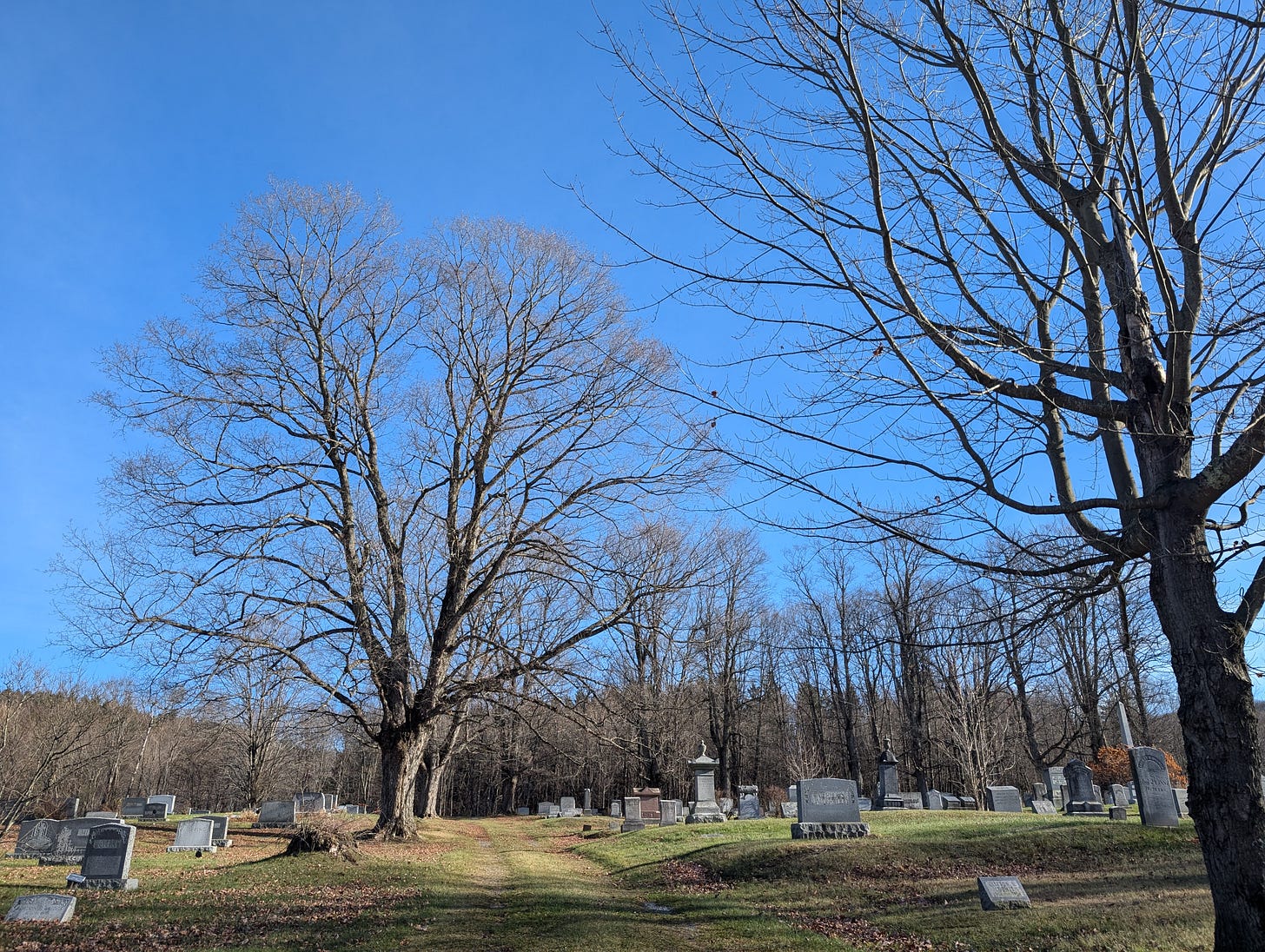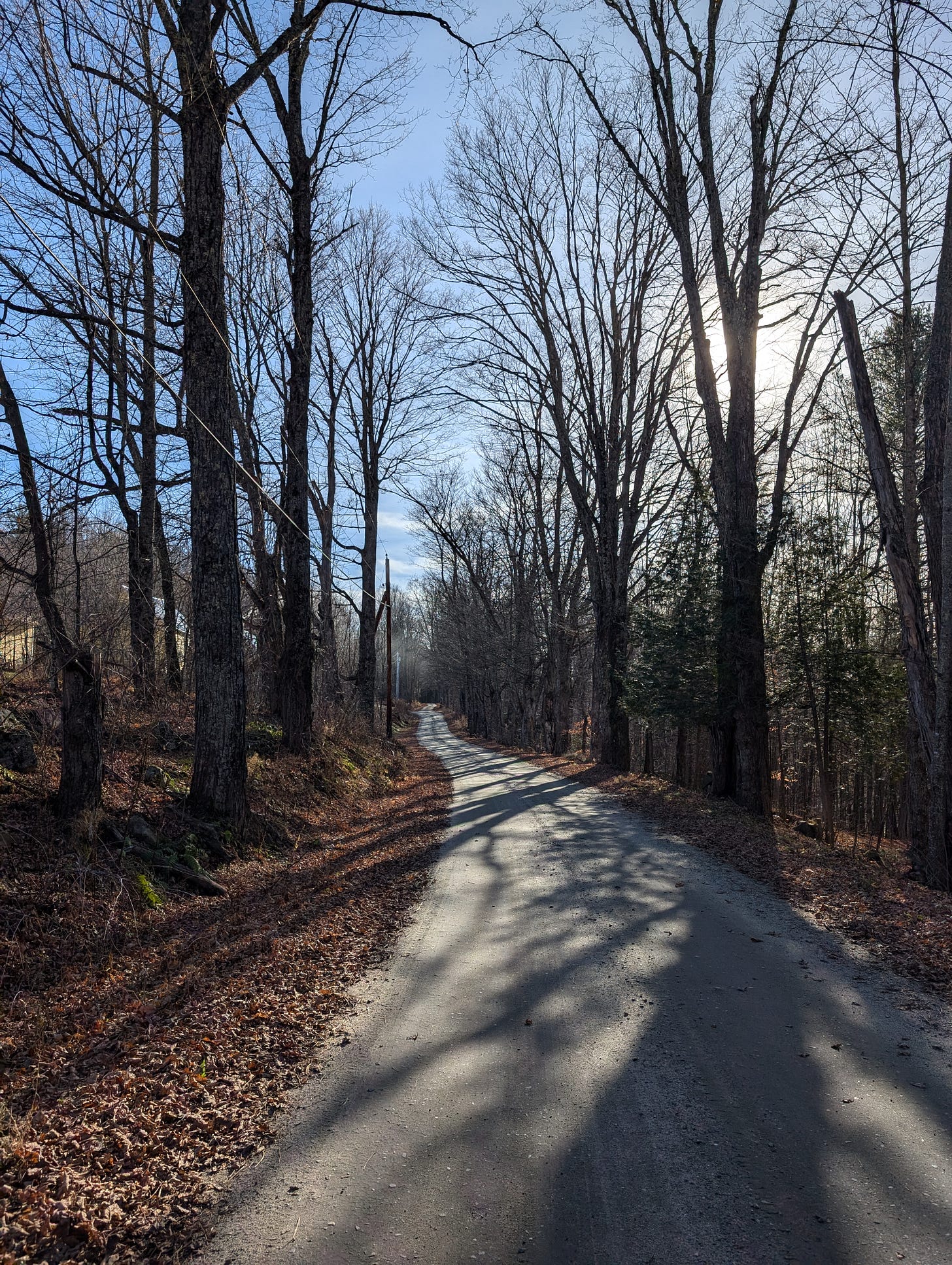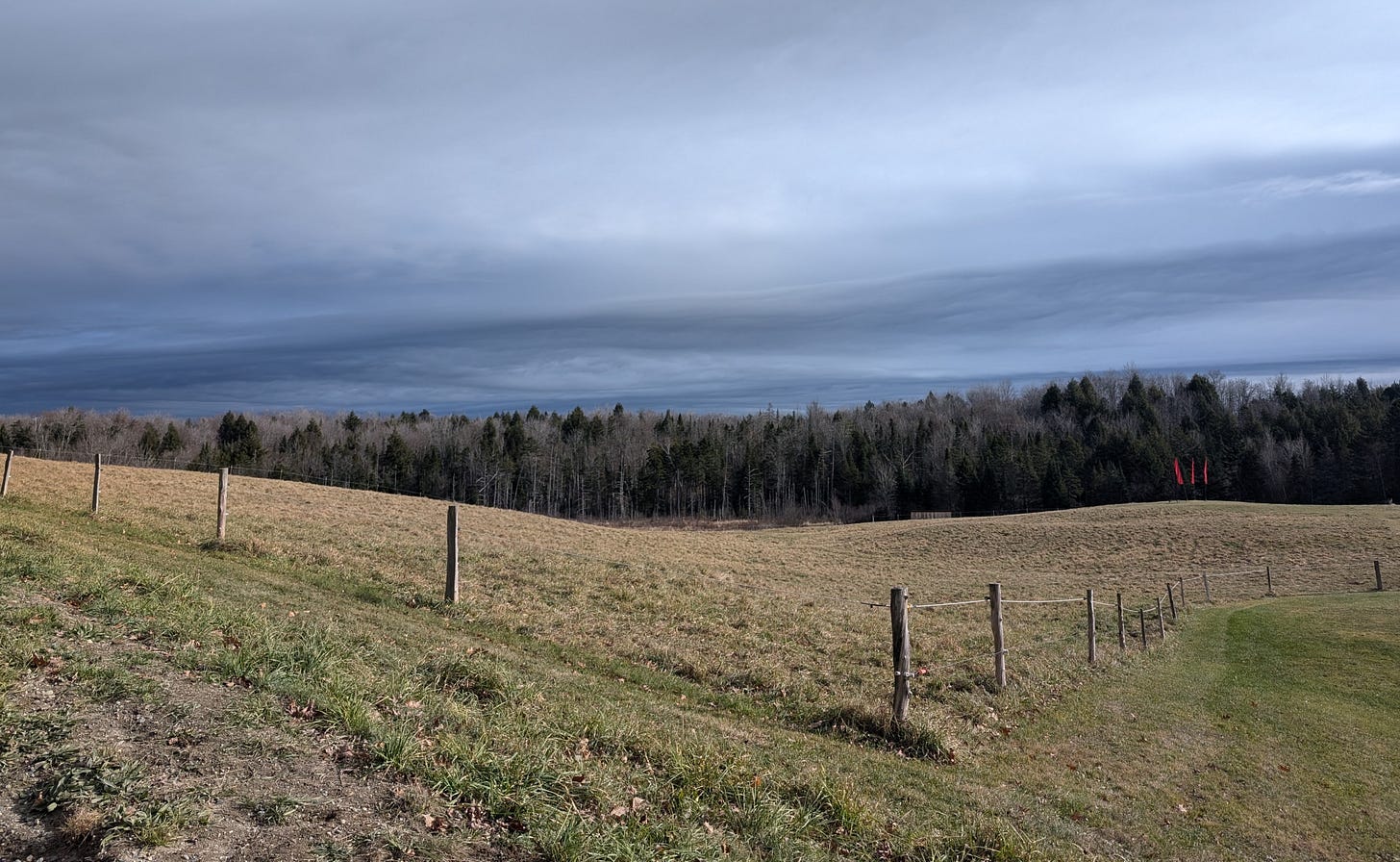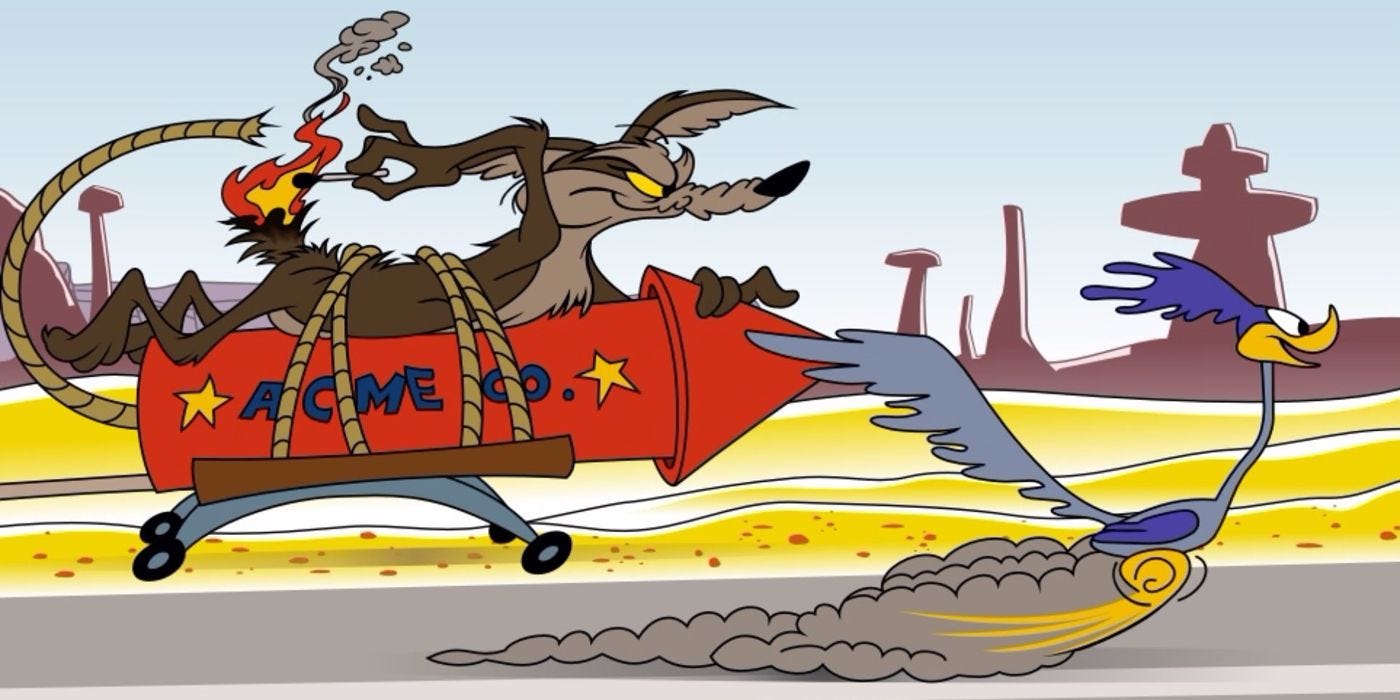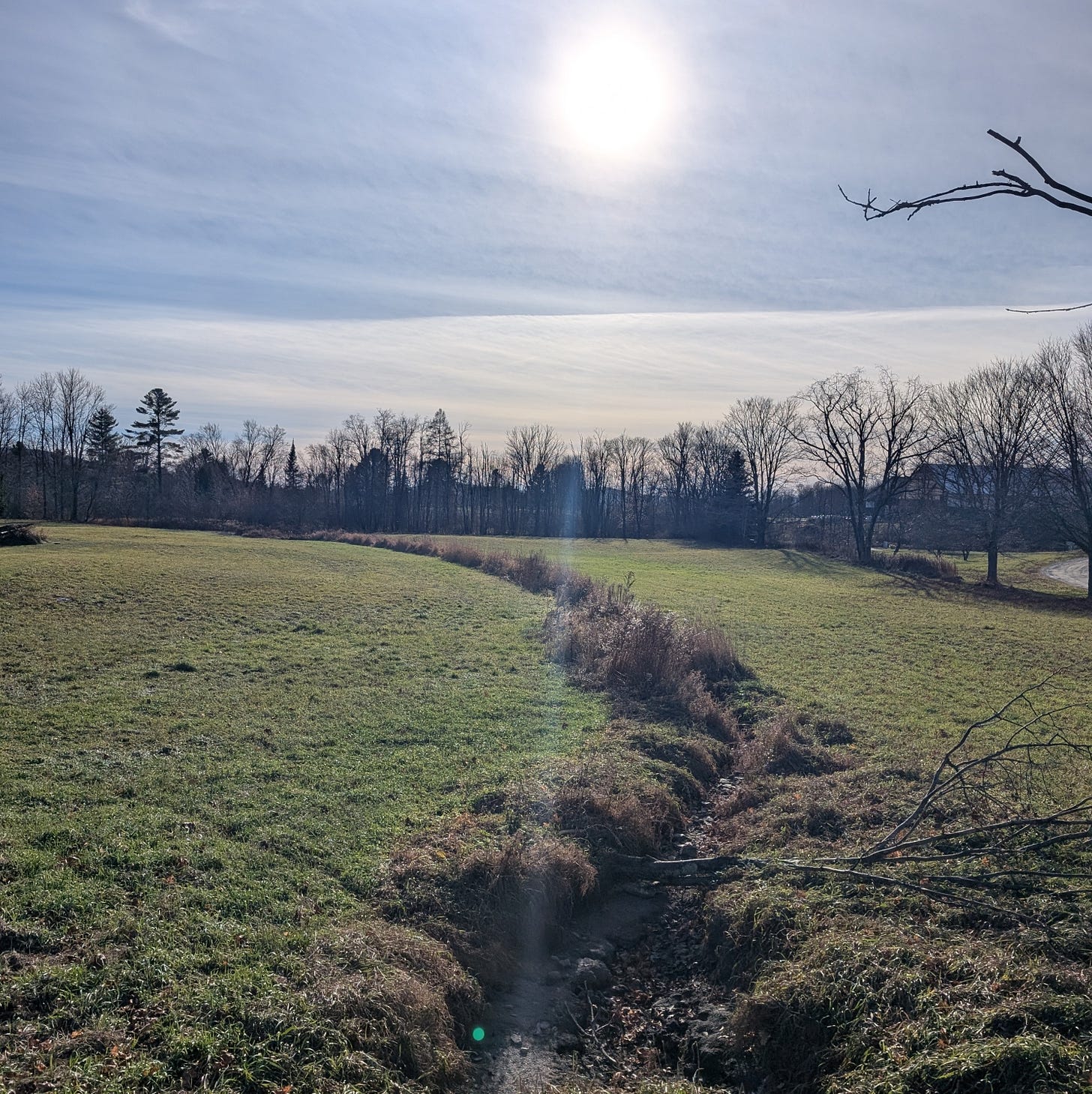'Til It's Over
Wile E. Coyote and The End
When he was sitting on the Mount of Olives opposite the temple, Peter, James, John, and Andrew asked him privately, “Tell us, when will this be, and what will be the sign that all these things are about to be accomplished?”
Then Jesus began to say to them, “Beware that no one leads you astray. Many will come in my name and say, 'I am he!' and they will lead many astray. When you hear of wars and rumors of wars, do not be alarmed; this must take place, but the end is still to come. For nation will rise against nation and kingdom against kingdom; there will be earthquakes in various places; there will be famines.”
“This is but the beginning of the birth pangs.”
Mark 13:3-8
My church community is in an increasingly unique situation in America: politically purple. It’s a challenge and opportunity, for we are called to minister to each other regardless of vote in a time when people are cutting each other off because of their vote.
One challenge for preachers to such groups is that I know some of us are living in different psychological realities based on how elections go. Right now, some people are feeling a ton of despair while others are feeling relieved and grateful, some may feel it’s not that big a deal, others like it’s The End.
Maybe for you, politics aren’t even really that important, but you’re still feeling despair over the state of the world, whether it’s the march of AI and technological encroachment, challenges for families, or the future in general. Maybe for you things are feeling personally bleak no matter what is happening in the larger world. Maybe you’ve had some hard loss. Maybe there are places close to your heart where it seems like evil is getting the upper hand. Maybe if it’s not The End, some things are coming to a still very real end for you.
Whatever the case may be, whether now or later, whenever you feel like it’s The End, know you are not alone, not now, nor across time.
Our Mark reading picks up where we left off last week. Jesus has just seen the corruption of the scribes exploiting the widow, and he’s looking at the temple and telling his followers that it’s all coming down (Mark 13:1-2). This makes them curious—well, when is it? When will we know it’s the End?
The Apocalyptic Impulse
Fear of The End is a deep perennial anxiety in us humans. So many different religions have something about the end times, and in Christianity, it is referred to as “the apocalypse,” which means, “the unveiling,” which is where the Book of Revelation gets its name and meaning. If we are ruled by death as individuals, this fear takes on a greater form in our collective animal’s existential dread. If in our personal sin we are ruled by death,1 we are also ruled by the looming collective death in The End.
Perhaps this is why countless people in history have thought they were living in the end times, and perhaps why this dread arises anytime something societally big is happening. Endless Christian groups in history thought they really were living in The End, whether it’s when the Second Temple fell, or when Rome fell, or when some charismatic leader says, “A-ha, I just re-did the math, and even though Jesus says ‘no one knows the day or the hour,’ we actually did figure out the exact day and hour, here’s the book you can buy.” And of course, they’ve been wrong every time.
We also know fears about The End are bigger than religion. The Cold War had many moments where people thought the Bomb could drop at any moment, many environmentalists worry about The End of our planet, humanists worry about The End of our species, it goes on and on. All of us will reach our own personal end, we experience smaller endings every day, and we witness the ends of an era, or a story, some things we wish would hurry up and end, and some things (like Mike Tyson) grab our attention because of how they defy The End we thought had taken place.
Despite all our human anxieties, which we see in Jesus’ disciples, there is good news and bad news here, the same that Jesus gives when he’s talking about all the death, destruction, and disaster to come: the good news is that it’s not The End….the bad news is, it’s still not The End yet. The bad news is there is still bad news to come; but the true End, when it comes, is going to be better than we could possibly imagine if we hold fast to faith.
Words from a Yogi, Plans of a Coyote
So we can forgive the disciples for their obsession with The End; we have it too. They keep pestering Christ, as if from the back seat, “Are we there yet? Are we there yet?” No, Jesus says, there will be signs, but, don’t take them too definitively. There will be people coming in my name, deceiving you, and all sorts of horrible things. But Jesus also sidesteps their yearning about when, as if that is not really the point. All they need to know it’s not over, and there is more for us to do here and now.
First, what I need to do here and now… it has been three weeks, and I have yet to boast about the World Series, which my world champion Los Angeles Dodgers won. In the last game, Game 5, they had gotten down three runs, which is not that unusual, but it was on the heels of losing Game 4. We Dodger fans were starting to feel the dread that things were about to come unraveled. Yet every baseball fan knows that no matter whether you’re down big or up a bunch, no matter how late it is in the game, there is no game clock in baseball. Nobody knows exactly how long there is left, just in outs. And so every baseball fan holds onto those words of Yogi Berra, “It ain’t over ‘til it’s over.”2
And in some sense, this is the teaching today from Jesus. Because when we think it’s over and The End, our fear can pull us down and sink us far down more than useful grieving. Our obsession with The End plays into the hands of evil which wants us to seduce us, deceive us, and make us overlook who really is in control.
Earlier this week in our elder bible study at the community care center, I noticed something as we read John’s depiction of the Last Supper. In both Luke and John, we hear that Judas does not act alone, but the devil possesses Judas, “enters into his heart,” and gets him to betray Jesus. Let’s think about two implications of this.
First, Jesus knows this happens, and he lets it happen. Does that mean he wants this to happen? No, just like he does not desire any evil. But he ends up bending evil towards an even greater good on the cross. It is just as in our own lives, he doesn’t want us to sin, but he will use us as sinners to make good. He doesn’t want you to be lost, but he uses your lostness to make it so much more glorious when you’re found.
The second implication of the devil’s plans is funny to me: the devil must think his plans will work. In the case of Judas, he snagged an insider, one of the closest to Christ, just in time to foil his salvation mission. I can even picture him like Wile E. Coyote from those old Roadrunner cartoons:
Most of us know how it goes: every time, the Coyote tries all these different ways to catch Roadrunner, first with things like hammers and anvils, and then increasingly ridiculous and intricate plans: painting a fake railroad track, climbing on a rocket to catch him, all this stuff. And every time, what happens? He falls into his own trap—the anvil lands on him, the rocket explodes on him, he falls off the cliff. Every time it looks like the Coyote is just about to win, it ain’t over ‘til it’s over.
So how’s this for some levity: whenever you feel despair, try to imagine evil like Wile E. Coyote, because he bears evil’s true track record throughout history. Just as sin distorts what is good,3 God bends evil toward his good. That doesn’t mean God wants evil to happen, that doesn’t mean he doesn’t mourn with lives lost, it doesn’t mean he wants the pain, nor does it mean he doesn’t want us to do anything about it. He bends it to his good. Because it ain’t over.
Sometimes when things are really heavy and hard and dark, we think of hope as almost foolish, naive, passive, something for the ignorantly blissful. But despair is naive too, and I say that as someone who can be deeply cynical and skeptical towards so much. Evil does often win temporarily. Bad people and bad actions go unpunished. Good people and the innocent get crushed. Corruption has bred more and more corruption every which way you look. But when evil thinks it has won, it has only sown the seeds of its own destruction (Gal 6:8). If you’re despairing over evil in the world, why do you think Wile E. Coyote will win this time anything more than a pyrrhic victory?
Again, “apocalypse” means “unveiling,” and unveiling is scary because evil unveils itself first. Some have wondered if power corrupts, or if power reveals; does power change who people are, or does it reveal who they are? A big question. But in either case, evil makes itself brazen and brash after hiding, and the risen lord is hidden in the small, the meek, the suffering. Death moves first, but not last, while the one who we hold fast to the confession of our hope is unseen…until one day, the veil drops. And as long as evil rules the day, know that it ain’t over ‘til it’s over.
Hold Fast
Since it ain’t over yet, what are we to do until it’s over?
Another reading from the lectionary helps us, today’s Hebrews passage. It is a word from a Christian community long ago that also waiting and wondering if it was The End, and it has prescriptions: “Let us hold fast to the confession of our hope without wavering, for he who has promised is faithful. And let us consider how to provoke one another to love and good deeds, not neglecting to meet together, as is the habit of some, but encouraging one another, and all the more as you see the Day approaching.” (Heb 10:23-25)
These are wonderfully outward, part of an apostolic church that does not just mean “of the Apostles,” but a “sent-out” church. As we hold fast to our hope, we are to provoke each other to love and be provoked, or “stir up” one another, a wonderful word choice. And we are to meet together—not just in church, and encourage each other when we do.
And if you’re really feeling an intense fear about the state of the world, consider what Dietrich Bonhoeffer said: “Do not fear Babylon, it has no power over you—it has already been judged—it is all merely dust and smoke and ruins. Do not take it so deadly seriously anymore, do not let your hatred and zealousness consume you, for it is all so temporary, so temporary—it is not even important anymore—other things, however, are indeed important—remain firm in faith, hold fast to Christ, do not be touched by Babylon, remain sober, and do not let fear overwhelm you: listen to God's voice, the Almighty, who says: fallen is Babylon the great.”4
Maybe it feels like the world is getting worse and worse, evil is marching on. Okay. Fair enough. But just wait and see. Just wait and see how God will twist evil on itself again. There will be lots more bad news in our life, even next week. But know that bad news and good news go together in the gospel. You’re a sinner, but good news: God is with you and has redeemed you. Bad news, you can’t save yourself, but you have someone who can. Bad news, your political leaders can’t save you, but thankfully, your king is in heaven. Bad news, Wile E. Coyote just bought a new weapon, but it’s gonna blow up in his face. Evil has put on a new mask, but it will be unveiled, as will the true kingdom. It ain’t over ‘til it’s over.
Good news has birth pangs, says Jesus, and until the baby is born, the baby ain’t born.5 The birth pangs of our life in Christ are when we come to a rock bottom where we know we need him. And it is then when not just we, but Christ, is born again. Likewise, goodness is born when evil seems to win. But there is still time for God to bend evil towards good. And ‘til it’s over, hold fast. Meet together. Encourage each other. And provoke each other to love.
Romans 5-7
Thanks to The Lectionary Lab for the idea nugget.
Romans 7
From a 1935 sermon on Revelation 14
See note 2



